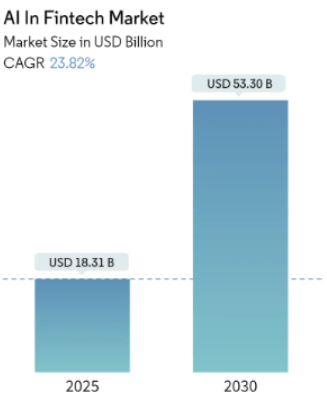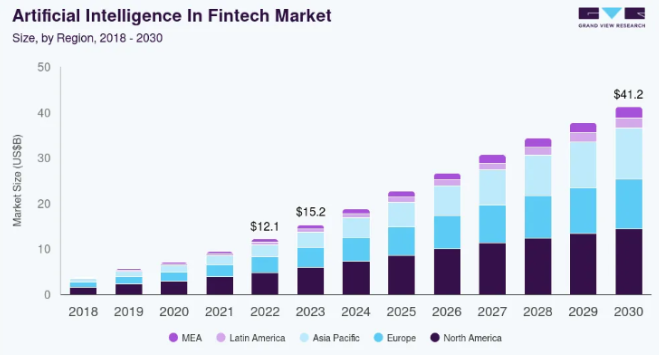The confluence of artificial intelligence and financial technology has created one of the most compelling investment narratives of 2025. Fintech companies listed on major exchanges including the Canadian Securities Exchange (CSE), New York Stock Exchange (NYSE), and Australian Securities Exchange (ASX) are pioneering revolutionary approaches to traditional financial services.
The global AI in fintech market has reached unprecedented heights, with valuations soaring from $15.4 billion in 2024 to projected figures of $53.30 billion by 2030, representing a compound annual growth rate (CAGR) of 23.82%. This explosive growth reflects the sector’s ability to address fundamental challenges in financial services whilst delivering superior customer experiences.
Market Revolution: Numbers That Tell the Story
Multiple research organisations paint a consistent picture of exponential growth. Grand View Research forecasts the AI fintech market reaching $79.4 billion by 2030 with a CAGR of 19.8%, whilst Market Data Forecast suggests an even more bullish trajectory toward $296.73 billion by 2033 at a remarkable 41.2% CAGR.
These projections aren’t merely speculative. They’re grounded in tangible business transformations occurring across payment processing, wealth management, and digital banking platforms. Companies are deploying machine learning algorithms for fraud detection, natural language processing for customer service automation, and predictive analytics for credit scoring.
Geographic Innovation Centres
North America dominates current market share with over 38.90% of global revenue as of 2023. The region benefits from mature regulatory frameworks, extensive venture capital networks, and sophisticated technology infrastructure that supports rapid fintech innovation.
Australia has emerged as a significant fintech hub, particularly in the buy-now-pay-later (BNPL) space and digital payments. The ASX hosts numerous AI-enhanced fintech companies that have gained international recognition for their innovative approaches to financial services.
Canada continues strengthening its position through the TSX and CSE, with companies like Nuvei demonstrating how Canadian fintech firms can compete globally through strategic AI integration and comprehensive payment solutions.

AI Fintech Market Growth Chart
The technological sophistication driving this growth extends beyond simple automation. Modern AI fintech applications encompass advanced machine learning models for risk assessment, computer vision for document processing, and sophisticated algorithms for real-time transaction optimisation.
Consumer behaviour shifts have accelerated adoption rates. The COVID-19 pandemic fundamentally altered how people interact with financial services, driving demand for contactless payments, digital-first banking experiences, and automated investment management. This behavioural transformation created fertile ground for AI-powered solutions that enhance convenience whilst reducing operational costs.
Financial institutions recognise AI implementation as essential rather than optional. Those embracing these technologies report improved operational efficiency, enhanced customer satisfaction, and superior risk management capabilities. Conversely, traditional financial service providers maintaining legacy systems face increasing competitive pressures from agile, AI-native fintech challengers.
NYSE AI Fintech Powerhouses: Block Leads the Charge
The New York Stock Exchange hosts some of the world’s most influential AI-powered fintech companies, with Block Inc. (NYSE: XYZ) standing as the undisputed leader in this space. Formerly known as Square, Block’s transformation into a comprehensive financial ecosystem showcases how AI integration can drive both innovation and market value.

Block’s AI Revolution
Block’s strategic pivot toward artificial intelligence became evident in 2025 when the company launched multiple AI-powered features across its Square and Cash App ecosystems. The company’s proprietary AI tool “Goose” represents a significant investment in machine learning capabilities for customer feedback analysis and business insights.
Block’s Q2 2025 results demonstrated the power of its AI-driven approach. Despite missing revenue expectations at $6.05 billion versus $6.31 billion expected, the company exceeded gross profit forecasts, delivering $2.54 billion compared to analysts’ estimates of $2.46 billion. This outperformance reflects AI’s contribution to operational efficiency and customer engagement.
The company’s AI implementations include:
Square AI Features:
- Automated product description generation for merchants
- AI-powered action recommendations based on customer messages
- Machine learning algorithms for payment optimisation
- Predictive analytics for inventory management
Cash App AI Integration:
- Advanced fraud detection systems
- Personalised financial recommendations
- Automated transaction categorisation
- AI-driven credit scoring for Cash App Borrow
Market Performance and Strategic Value
Block’s commitment to AI has translated into substantial market recognition. The company was added to the S&P 500 in July 2025, reflecting institutional confidence in its long-term strategic direction.
Current financial metrics highlight Block’s market position:
- Market Capitalisation: $48.27 billion
- Share Price: $79.12 (as of August 2025)
- 52-Week Range: $44.27 to $99.26
- Employee Count: 12,000 professionals
Block’s dual ecosystem model creates powerful network effects. The Cash App serves 23 million monthly active users, whilst Square processes payments for millions of merchants worldwide. AI enhances both platforms by improving transaction success rates, reducing fraud, and personalising user experiences.
Investment Thesis and Future Prospects
Analysts maintain generally positive outlooks for Block, with price targets ranging from $35 to $105 per share. The divergence reflects uncertainty about execution speed rather than strategic direction. Block’s AI investments position the company for sustained competitive advantages in:
- Payment Processing Efficiency: Machine learning optimises transaction routing and reduces decline rates
- Risk Management: Advanced algorithms detect fraudulent patterns in real-time
- Customer Acquisition: AI-powered insights enable targeted marketing campaigns
- Product Development: Data analytics inform feature prioritisation and user experience improvements
Block’s international expansion strategy also benefits from AI capabilities. The company’s 25% year-over-year gross payment volume growth internationally demonstrates how AI-enhanced platforms can scale efficiently across diverse markets and regulatory environments.
ASX Fintech Innovation Hub: Australia’s AI-Powered Financial Future
The Australian Securities Exchange has established itself as a global centre for fintech innovation, particularly in artificial intelligence applications for digital payments and alternative lending. Australian fintech companies have demonstrated remarkable ability to identify market gaps and deploy AI solutions that address consumer needs whilst maintaining regulatory compliance.
The BNPL Revolution Goes AI
Australia pioneered the Buy Now, Pay Later (BNPL) model through companies like Afterpay (now part of Block) and Zip Co Limited (ASX: ZIP). These platforms increasingly rely on AI for credit assessment, fraud prevention, and customer engagement.
Zip Co’s AI Strategy: Zip has embraced AI-powered financial tools under CEO Cynthia Scott’s leadership. The company’s focus on AI-driven risk assessment has improved approval rates whilst maintaining responsible lending practices. Key AI implementations include:
- Dynamic Credit Scoring: Machine learning algorithms analyse spending patterns and payment history
- Fraud Detection: Real-time transaction monitoring identifies suspicious activity
- Personalised Offers: AI recommends appropriate credit limits based on individual financial profiles
- Customer Service Automation: Chatbots handle routine enquiries, reducing operational costs
Emerging ASX Fintech Players
Beyond BNPL giants, several ASX-listed companies are leveraging AI to transform financial services:
Tyro Payments Ltd (ASX: TYR) specialises in EFTPOS solutions and business banking for SMEs. The company’s AI-enhanced payment processing systems provide:
- Predictive analytics for merchant cash flow management
- Automated reconciliation processes
- Intelligent routing for optimal transaction processing
- Risk assessment for business lending decisions
Sezzle Inc (ASX: SZL) differentiates itself through AI and data analytics integration across its BNPL platform. The company’s proprietary algorithms assess creditworthiness using alternative data sources, enabling financial inclusion for underbanked consumers.
Novatti Group (ASX: NOV) represents the next generation of ASX fintech companies. With a recent AUD 40 million share placement, Novatti focuses on B2B payments with AI-powered compliance and fraud prevention systems.
Regulatory Advantages and AI Adoption
Australia’s regulatory environment supports fintech innovation whilst maintaining consumer protection standards. The Australian Prudential Regulation Authority (APRA) and Australian Securities and Investments Commission (ASIC) have developed frameworks that encourage AI adoption for:
- Enhanced Due Diligence: Machine learning improves customer onboarding and KYC processes
- Real-time Risk Monitoring: AI systems detect potential compliance breaches before they occur
- Consumer Protection: Algorithms identify vulnerable customers requiring additional support
- Market Integrity: Advanced analytics monitor for market manipulation and insider trading
Performance Metrics and Market Position
ASX fintech companies have delivered mixed but generally positive performance in 2025:
Market Capitalisation Leaders:
- Block (through Afterpay acquisition): Part of $48.27 billion global market cap
- Zip Co: Significant player in global BNPL market
- Tyro Payments: Focused on SME payment solutions
- EML Payments: Prepaid and gift card services with AI integration
The Australian fintech sector benefits from several competitive advantages:
- Time Zone Positioning: Ideal for serving Asian-Pacific markets
- Regulatory Clarity: Clear guidelines for AI implementation in financial services
- Talent Pool: Strong technology and finance expertise
- Consumer Adoption: High smartphone penetration and digital payment acceptance
Australian consumers have demonstrated remarkable willingness to adopt AI-powered financial services. Afterpay Day has become a seasonal retail event, whilst mobile payment adoption rates exceed global averages in most metropolitan areas.
CSE and TSX: Canada’s Fintech Emergence
Canada’s financial technology sector has gained significant momentum through strategic AI adoption and international expansion. Companies listed on the Canadian Securities Exchange (CSE) and Toronto Stock Exchange (TSX) demonstrate how artificial intelligence can drive global competitiveness in payment processing and digital financial services.
Nuvei: Canadian Fintech Excellence
Nuvei Corporation (formerly traded as TSX: NVEI, NASDAQ: NVEI) stands as Canada’s flagship fintech success story. Although the company completed its private acquisition by Advent International in November 2024, its legacy as a TSX innovation leader continues to influence Canadian fintech development.

Nuvei’s AI-Powered Platform: During its public tenure, Nuvei demonstrated how Canadian fintech companies can compete globally through AI integration:
- Real-time Transaction Optimisation: Machine learning algorithms route payments through optimal channels
- Multi-currency Processing: AI handles complex foreign exchange calculations and routing
- Fraud Prevention: Advanced pattern recognition identifies suspicious transaction behaviour
- Merchant Analytics: Predictive models help clients optimise payment acceptance rates
Nuvei’s acquisition for $ 6.3 billion validated the strategic value of AI-powered payment processing platforms. The company processed over 720 alternative payment methods across 200+ markets, showcasing scalability achievable through intelligent automation.
Emerging Canadian AI Fintech Players
Ceridian HCM Holdings (TSX: CDAY) represents Canada’s human capital management evolution. The $ 13.92 billion market capitalisation company leverages AI for payroll processing and workforce analytics, with applications extending to financial wellness and employee benefit optimisation.
TELUS International (TSX: TIXT) provides AI-powered solutions for fintech companies globally. The company’s AI Data Solutions product helps financial institutions test and improve machine learning models for:
- Enhanced fraud detection accuracy
- Improved customer service chatbots
- Better credit scoring algorithms
- Automated compliance monitoring
Core AI Applications Transforming Financial Services
The integration of artificial intelligence across fintech platforms has revolutionised traditional financial service delivery. These applications extend far beyond simple automation, creating intelligent systems that learn, adapt, and improve performance continuously.
Robo-Advisory: Democratising Wealth Management
The robo-advisory sector exemplifies AI’s transformative impact on financial services. Global market valuations have reached $11.8 billion in 2024, with projections indicating growth to $92.2 billion by 2033 at a CAGR of 24.33%.
Technological Sophistication: Modern robo-advisors employ sophisticated algorithms for:
- Portfolio Optimisation: Machine learning adjusts asset allocation based on market conditions and individual risk profiles
- Tax-Loss Harvesting: AI identifies opportunities to minimise tax liability through strategic selling
- Rebalancing Automation: Systems automatically maintain target allocations as market values fluctuate
- Goal-Based Investing: Personalised strategies align investments with specific financial objectives
Market Leaders and Innovation: Companies like Betterment, Wealthfront, and Vanguard continue pushing technological boundaries. Hybrid robo-advisors, combining AI capabilities with human expertise, represent the fastest-growing segment with expected market value of $20 billion by 2030.
Also Read: AI Infrastructure Stocks on ASX, LSE & TSXV Empowering Global Smart Systems
Fraud Detection and Prevention: AI’s Security Revolution
Financial fraud costs the global economy billions annually, making AI-powered detection systems essential for institutional survival. Advanced machine learning algorithms analyse transaction patterns, user behaviour, and environmental factors to identify potential fraud in real-time.
Detection Capabilities:
- Pattern Recognition: AI identifies anomalous spending patterns that human analysts might miss
- Velocity Monitoring: Systems track transaction frequency and flag unusual activity spikes
- Device Fingerprinting: Machine learning creates unique device profiles to detect unauthorised access
- Biometric Authentication: AI processes facial recognition, voice patterns, and behavioural biometrics
Performance Improvements: Leading financial institutions report:
- Fraud detection accuracy improvements exceeding 90%
- False positive reductions of 60-70%
- Investigation time reductions of 80%
- Customer friction reductions whilst maintaining security standards
Companies like ComplyAdvantage and Chainalysis demonstrate how specialised AI applications can address specific compliance and security challenges within broader fintech ecosystems.
Regulatory Compliance Automation: Reducing Complexity Through Intelligence
Financial services face increasingly complex regulatory environments across multiple jurisdictions. AI-powered compliance systems help institutions navigate these challenges whilst reducing operational costs and improving accuracy.
RegTech Applications:
- Automated Reporting: Machine learning generates regulatory submissions with minimal human intervention
- Risk Assessment: AI evaluates counterparty risk and regulatory exposure continuously
- Transaction Monitoring: Systems scan for suspicious activities across multiple compliance frameworks
- Document Processing: Natural language processing extracts key information from regulatory documents
The RegTech market benefits from AI advancement, with platforms like H2O.ai and DataRobot providing sophisticated machine learning solutions for financial institutions worldwide.
Digital Banking AI: Personalising Financial Experiences
Traditional banking institutions and digital-first challengers increasingly rely on AI to differentiate their offerings and improve customer satisfaction. These applications extend across multiple touchpoints in the customer journey.
Customer Experience Enhancement:
- Chatbot Integration: Natural language processing enables sophisticated customer service automation
- Personalised Recommendations: AI suggests relevant products based on spending patterns and life events
- Credit Decisioning: Machine learning algorithms assess creditworthiness using alternative data sources
- Financial Wellness: AI-powered insights help customers improve their financial health through personalised advice
Investment Opportunities and Market Trends
The convergence of artificial intelligence and financial technology creates compelling investment opportunities across multiple themes and geographic regions. Investors seeking exposure to this transformative sector can consider various approaches depending on risk tolerance and investment horizon.
Direct Equity Investment Strategies
Large-Cap Established Players: Companies like Block, Visa, and Mastercard offer stable exposure to AI fintech trends whilst providing dividend income and established market positions. These firms benefit from:
- Extensive data assets for AI model training
- Significant R&D budgets for continued innovation
- Regulatory compliance expertise
- Global distribution networks
Mid-Cap Growth Opportunities: Emerging fintech companies on major exchanges provide higher growth potential with corresponding increased risk. Key characteristics include:
- Rapid user acquisition and market share gains
- Innovative AI applications addressing specific market needs
- Strong management teams with proven execution capabilities
- Clear paths to profitability through AI-driven efficiency gains
Small-Cap Innovation Leaders: Early-stage fintech companies offer maximum upside potential for investors willing to accept higher volatility. Due diligence should focus on:
- Proprietary AI technology and intellectual property
- Regulatory approval status and compliance framework
- Partnership relationships with established financial institutions
- Management experience and industry expertise
Exchange-Traded Fund Exposure
For investors seeking diversified exposure, several ETFs focus on fintech and AI themes:
Global Fintech ETFs:
- Provide broad exposure to fintech innovation across multiple geographies
- Include both pure-play fintech companies and traditional financial institutions embracing AI
- Offer professional management and research capabilities
AI-Focused Technology Funds:
- Target artificial intelligence applications across multiple industries
- Include fintech as a significant sector allocation
- Benefit from broader AI adoption trends beyond financial services
Regional Investment Themes
North American Focus: The NYSE and NASDAQ host the largest and most liquid AI fintech stocks. Advantages include:
- Mature regulatory frameworks supporting innovation
- Access to venture capital and growth funding
- Large domestic markets for scaling operations
- Strong intellectual property protection
Asia-Pacific Growth: Australian and Asian fintech markets offer compelling growth opportunities:
- Rapidly expanding middle-class populations
- High smartphone and internet penetration rates
- Supportive government policies for digital financial services
- Cultural acceptance of technology-driven financial solutions
Emerging Market Opportunities: Developing economies present unique investment prospects:
- Large unbanked and underbanked populations
- Leapfrog potential bypassing traditional banking infrastructure
- Mobile-first financial service adoption
- Government initiatives supporting financial inclusion

Global Fintech Investment Flows by Region 2025
Future Outlook: The Next Wave of AI Fintech Innovation
The trajectory of AI fintech development suggests several key trends that will shape the industry through 2030 and beyond. These developments will create new investment opportunities whilst potentially disrupting existing business models.
Emerging Technology Integration
Quantum Computing Applications: As quantum computing becomes commercially viable, fintech companies will gain access to unprecedented processing power for:
- Complex risk modelling and portfolio optimisation
- Advanced cryptographic security systems
- Real-time fraud detection across massive transaction volumes
- Sophisticated predictive analytics for market movements
Blockchain and Distributed Ledger Technology: Integration between AI and blockchain creates opportunities for:
- Automated smart contract execution based on AI decision-making
- Decentralised autonomous organisations (DAOs) for investment management
- Enhanced security through AI-powered consensus mechanisms
- Cross-border payment optimisation using AI routing algorithms
Internet of Things (IoT) Data Integration: Connected devices will provide new data sources for AI fintech applications:
- Insurance premium calculations based on real-time behavioural data
- Credit scoring using IoT device payment patterns and usage
- Personalised financial advice based on lifestyle and spending patterns
- Automated savings and investment based on consumption data
Regulatory Evolution and Standardisation
Global regulatory bodies are developing comprehensive frameworks for AI in financial services. Key developments include:
Algorithmic Accountability: Regulations requiring explainable AI decisions in financial services will drive:
- Improved transparency in credit decisioning
- Enhanced consumer protection through algorithm auditing
- Standardised AI testing and validation procedures
- Greater regulatory oversight of AI model performance
Cross-Border Harmonisation: International cooperation on AI fintech regulation will enable:
- Simplified compliance for globally operating fintech companies
- Enhanced consumer protection across jurisdictions
- Improved information sharing for fraud prevention
- Standardised data privacy and security requirements
Market Maturation and Consolidation
As the AI fintech sector matures, several trends will reshape the competitive landscape:
Strategic Acquisitions: Established financial institutions will continue acquiring AI fintech capabilities through:
- Technology acquisitions for specific AI capabilities
- Talent acquisitions to build internal AI expertise
- Customer base acquisitions for data and market share
- Partnership acquisitions for regulatory and compliance expertise
Platform Consolidation: Market leaders will expand their service offerings to create comprehensive financial ecosystems:
- Single platforms offering banking, payments, investments, and insurance
- API-driven integration enabling third-party service providers
- White-label solutions for traditional financial institutions
- Vertical-specific solutions for particular industries or demographics
Also Read: Australia’s Critical Minerals Strategy 2025: Global Investors’ Next Big Opportunity
Conclusion
The intersection of artificial intelligence and financial technology represents one of the most significant investment themes of our time. Companies listed on the CSE, NYSE, and ASX are pioneering applications that fundamentally transform how we interact with financial services.
From Block’s comprehensive AI integration across payment processing and digital banking to Australia’s innovative BNPL solutions and Canada’s global payment processing capabilities, these markets offer diverse opportunities for investors seeking exposure to this transformative sector.
The projected market growth from $ 18.31 billion in 2025 to $ 53.30 billion by 2030 reflects not just technological advancement but fundamental shifts in consumer behaviour, regulatory frameworks, and business models.
Success in this sector requires understanding both technological capabilities and market dynamics. Investors who recognise the strategic value of AI-powered financial services whilst carefully evaluating execution risk and competitive positioning will be best positioned to benefit from this ongoing transformation.
The future of finance is increasingly intelligent, automated, and personalised. Companies that master this transition will create substantial shareholder value whilst reshaping the global financial services landscape for generations to come.
Frequently Asked Questions
Q: What are the best AI fintech stocks to buy in 2025?
A: Top AI fintech stocks include Block (NYSE: XYZ) for comprehensive payment solutions, established companies like Visa and Mastercard for stable AI integration plays, and emerging players on the ASX like Zip Co for growth potential. Investment decisions should consider individual risk tolerance, geographic preferences, and investment horizon.
Q: How is AI transforming traditional banking services?
A: AI revolutionises banking through automated customer service, personalised financial advice, sophisticated fraud detection, streamlined loan approvals, and predictive analytics for risk management. These applications reduce operational costs whilst improving customer experiences and regulatory compliance.
Q: Which stock exchanges offer the best fintech investment opportunities?
A: The NYSE provides access to large-cap established players, the ASX specialises in innovative payment solutions and BNPL companies, whilst the TSX offers exposure to emerging Canadian fintech companies. Each exchange presents unique opportunities depending on investment strategy and risk appetite.
Q: What risks should investors consider when investing in AI fintech stocks?
A: Key risks include regulatory changes affecting AI applications, cybersecurity threats, intense competition from both fintech startups and traditional institutions, technology obsolescence, and economic downturns affecting consumer and business spending on financial services.
Q: How do robo-advisors use AI to manage investments?
A: Robo-advisors employ machine learning for portfolio optimisation, automated rebalancing, tax-loss harvesting, risk assessment, and personalised investment recommendations. These systems analyse market data, individual financial situations, and investment goals to provide tailored investment management services.
Q: What is the difference between pure AI fintech companies and traditional institutions adopting AI?
A: Pure AI fintech companies build their entire business model around artificial intelligence capabilities, often offering more innovative solutions and faster adaptation to market changes. Traditional institutions adopting AI benefit from established customer bases, regulatory relationships, and capital resources but may face cultural and technological challenges in implementation.












